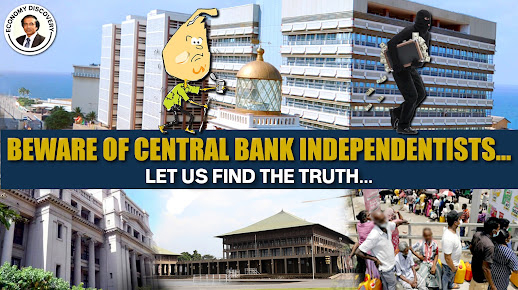Central Bank Independence and Prudent Economic Fundamentals - Will the Public come out of the present bankruptcy?
Lanka News Web has reported two news items given below.
1. State Finance Minister Shehan Semasinghe assets "that prudent economic fundamentals are being deployed towards economic stabilization and to raise the economic growth rate to around 7%-8% in the next two years."
2. CB Governor Nandalal Weerasinghe says new Act to "strengthen Central Bank Independence" and thereby curb monetary financing of the budget and place a check on inflation" is to be enacted shortly: new law said to be a "prior action" to unlock the IMF deal that is yet to take place even after 8-1/2 months of negotiation.
The purpose of this article is to educate readers of some of public issues involved in the two news items as highlighted below.
Prudent Economic Fundamentals
- What are those prudent economic fundamentals, at least a list,
- From where those are bought to be deployed?
- What is their link to economic stabilization and to economic growth rate around 7%-8% in the next two years?
A new Act for Central Bank Independence
- Whether the present Monetary Law Act is repealed and members of the Central Bank are let to act anyway they want?
- Will there be a new set of currency to be issued by the newly independent central bank and who will pay the face value of the present currencies?
- Whether capital of the Central Bank already provided by the Government is removed?
- Whether the EPF, Foreign Exchange Department, Financial Intelligence Unit, fiscal agent and agent of the Government, issuance of Government Securities on behalf of the Government, official depository of the Government and bank supervision are removed from the new Central Bank to avoid conflicts between the Central Bank and Government?
- Whether public debt management is immediately removed to the new debt office and the Governor is prosecuted for constitutional offence of default of debt after 72 years of debt management?
- Who appoints members of the Central Bank? Will their be a separate general election? Can they be foreign nationals?
- On whose behalf money will be printed? Against private assets of the members of the Central Bank?
- Will the Central Bank be permitted to buy government debt in the primary market or secondary market for printing money?
- In the event the Government finds difficult to borrow in the market for public projects, will the Government authorize the state banks to print money for the Government?
- Will the foreign currency proceeds of the Government be sold to state banks at market rates?
- What are the assets the Central Bank is permitted to acquire for printing money? Will the members of the Central Bank pay for bad assets?
- Will the members of the Central Bank share its profit and losses?
- Who will audit the money printing? Private auditors?
- Will the Government remove price control and subsidies for letting the Central Bank to control inflation as its members wish?
- Who will offer the price index to the Central Bank for monitoring and controlling inflation? Will the Central Bank have its own price index?
- If inflation rises above set limits, will members of the Central Bank be prosecuted for financial losses to the public?
- In the case of a banking liquidity crisis, will the members of the Central Bank payout deposits?
- In the event of a collapse of the monetary system, will the members of the Central Bank pay for the value of currency? If not, are they prosecuted for financial fraud?
- Will the members of the Central Bank be outside the Constitution?
- Whether such a mignitude of sacrifice of the state monetary powers is worth for 2.9 bn from IMF which is still undoubted.
(This article is released in the interest of participating in the professional dialogue to find out solutions to present economic crisis confronted by the general public consequent to the global Corona pandemic, subsequent economic disruptions and shocks both local and global and policy failures.)
P Samarasiri
Former Deputy Governor, Central Bank of Sri Lanka




Comments
Post a Comment